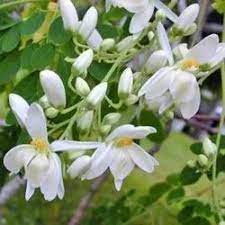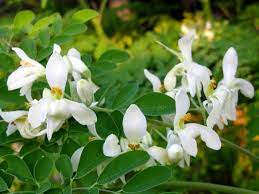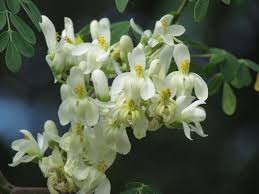Moringa flowers are a key component of the plant and are not as commonly used as the leaves or seeds, but they do have their own set of benefits and uses. Moringa flowers are small, white, and fragrant. They have five petals and are typically around 1-1.5 centimeters in diameter.
Moringa flowers are edible and can be used in various culinary dishes. They have a mild, slightly peppery flavor, making them a great addition to salads, soups, and other recipes. Moringa flowers, like other parts of the plant, are rich in vitamins and minerals. They contain essential nutrients such as vitamin C, calcium, potassium, and iron.
In traditional medicine, Moringa flowers are used to treat various ailments. They are believed to have anti-inflammatory, antimicrobial, and antioxidant properties. They have been used to alleviate digestive issues and as a remedy for colds and flu. Moringa flowers can be used to make infusions or tea. The flowers are steeped in hot water, and the resulting infusion is consumed for its potential health benefits.
Some cosmetics and skincare products incorporate Moringa flower extracts for their purported skin-nourishing properties. The antioxidants present in the flowers may help protect the skin from free radicals. Moringa flowers can be used in various dishes, including salads, stir-fries, fritters, and soups. They add a delicate flavor and nutritional value to the meals.
It is essential to ensure that the Moringa flowers are sourced from a reputable and safe source, especially if you plan to consume them. As with any plant or herb, moderation and appropriate preparation are key to enjoying their benefits safely.
The Economic Importance and Uses of Moringa Flowers

Moringa, also known as the drumstick tree or horseradish tree, is a plant known for its various health and nutritional benefits. The flowers of the Moringa tree have several economic importance and uses, both in traditional and modern contexts.
Here are some of them:
1. Culinary Use: Moringa flowers are edible and often used in traditional cuisines. They can be added to salads, soups, stir-fries, and other dishes. The flowers have a mild, slightly peppery taste, making them a versatile addition to various recipes.
2. Nutritional Value: Moringa flowers are rich in essential nutrients, including vitamins (e.g., vitamin C), minerals (e.g., iron, calcium), and antioxidants. Consuming them can supplement the diet and contribute to overall nutrition and health.
3. Herbal Medicine: In traditional medicine, Moringa flowers are used to treat various ailments. They are believed to have anti-inflammatory, antibacterial, and anti-oxidative properties, and may be used to manage conditions like fever, asthma, and hypertension.
4. Health and Wellness Products: Moringa flowers can be used to create health and wellness products, such as teas, extracts, or dietary supplements. These products are marketed for their potential health benefits and nutritional content.
5. Cosmetic and Personal Care Products: Extracts from Moringa flowers are used in cosmetics and personal care products, including lotions, creams, shampoos, and soaps. They are valued for their natural, nourishing, and moisturizing properties.
6. Horticulture and Landscaping: Moringa flowers are aesthetically pleasing and can be used in landscaping and gardening to enhance the visual appeal of gardens, parks, and public spaces. The tree itself is known for its attractive foliage and flowers.
7. Honey Production: Moringa flowers can attract bees and other pollinators, making them valuable for beekeepers. Bees use the nectar from the flowers to produce honey, contributing to honey production and apiculture.
8. Fertilizer and Soil Conditioning: The leaves and flowers of the Moringa tree are rich in nutrients, which can be used to create organic fertilizers or as a natural soil conditioner. This enhances soil fertility and promotes better plant growth.
9. Livestock Feed: Moringa flowers, along with other parts of the Moringa tree, can be used as a supplementary feed for livestock. They are a good source of nutrition for animals, providing essential vitamins and minerals.
10. Seed Production: Moringa flowers are the precursors to seed pods, which contain seeds that can be harvested for growing new Moringa trees. The seeds are essential for propagation and expanding Moringa cultivation.
Read Also: Soil Water Conservation in Organic Crop System Contents
11. Bioremediation: Moringa flowers can be used in phytoremediation, a process that uses plants to remove pollutants and contaminants from soil and water. Moringa trees, including their flowers, are known for their ability to absorb heavy metals and purify water.
The Products and By-products That Can Be Derived From Moringa Flowers

Moringa (Moringa oleifera) is a versatile plant known for its various parts that can be used for both nutritional and medicinal purposes. Moringa flowers, in particular, offer several products and by-products that can be derived for various uses.
Here’s a list and explanation of potential products and by-products from Moringa flowers:
1. Edible Flowers: Moringa flowers are edible and can be used in salads, as garnish, or cooked in various dishes. They have a slightly peppery flavor, making them a unique addition to culinary creations.
2. Tea: Moringa flower petals can be dried and used to make a fragrant, mild-tasting tea. The tea is known for its potential health benefits, including being a source of antioxidants and aiding digestion.
3. Infused Oils: Moringa flower petals can be infused into oils, such as olive or coconut oil, to create a fragrant and nutrient-rich oil. This infused oil can be used in cooking or as a base for natural skincare products.
4. Potpourri: Dried Moringa flower petals can be used in potpourri or sachets, providing a pleasant fragrance to indoor spaces.
5. Medicinal Extracts: Moringa flower extracts can be used for their potential medicinal properties, including anti-inflammatory and antioxidant effects. These extracts may be incorporated into dietary supplements or health products.
6. Moringa Flower Powder: Dried Moringa flowers can be ground into a fine powder. This powder can be used as a supplement, in smoothies, or added to various food recipes to enhance their nutritional content.
7. Natural Dye: Moringa flowers can be used to create natural dyes for fabrics and other materials, providing a range of yellow to green hues.
8. Animal Feed: Dried Moringa flowers can be used as a nutritious component in animal feed, providing essential nutrients for livestock and poultry.
9. Compost and Fertilizer: Moringa flowers, along with other plant parts, can be composted to create nutrient-rich organic fertilizer, promoting healthy plant growth.
10. Livestock Forage: Fresh or dried Moringa flowers can be used as forage for livestock, providing additional nutrition and dietary variety.
11. Bee Forage: Moringa flowers can attract bees and other pollinators, making them a valuable addition to a garden or agricultural setting to enhance pollination.
12. Biofuel Production: Moringa flowers, along with other parts of the plant, can be used in the production of biofuels through the extraction of oil for biodiesel production.
In conclusion, it is important to note that the utilization of Moringa flowers and derived products may vary based on cultural practices, local availability, and desired applications. Additionally, proper processing and handling techniques should be employed to ensure safety and efficacy in using these products and by-products.
Read Also: Benefits of Passion Flowers

